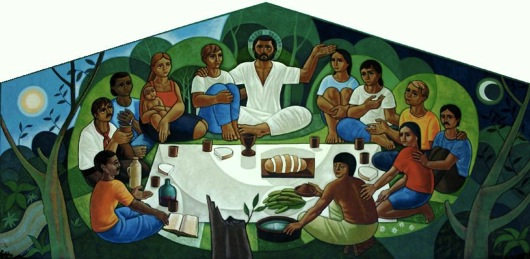Twenty Second Sunday in Ordinary Time
- Sirach 3:17-18, 20, 28-29
- Hebrews 12:18-19, 22-24
- Luke 14:1, 7-14

Reflection written by: Gayle Sommerfeld
All the readings this week touch on humility. Sirach 3 reminds us to “conduct your affairs with humility,” and to “humble yourself the more the greater you are, and you will find favor with God.” Humility is about truth. It is about understanding our right relationship with God and with each other. Dishonesty in any form detracts our ability to perceive that right relationship, turning humility into a secret form of pride, although it does eventually become a lot less secret than we think. We find favor with the Lord, as Sirach notes, as we become increasingly humble, in that we understand that our gifts come from the Lord. Humility is in understanding that they do not come from us and are meant in some way to serve our brothers and sisters — as theirs are meant to serve us.
Paul writes to the Hebrews reminding them that the new covenant brings them to “the heavenly Jerusalem,” depicting the kingdom of God in glorious terms. The contrast in Paul’s letter to the Hebrews also hints at this right relationship between the Lord and us.
In Luke, Jesus was invited to a banquet at the home of a leading Pharisee, and probably not because the Pharisee was a big fan. The reason behind the invitation likely was that the Pharisee wanted to get a closer look at Jesus. The Pharisees were watching his every move. They wanted to see where he would seat himself. They wanted to see what he thought of himself; how important he thought he may be. However, they made a mistake, in that they did not realize Jesus was also watching them. Imagine Jesus’ reaction to the scene unfolding before him. When Jesus arrived, he noticed all the important people were jockeying to get the seats closest to him at table while those of lower classes sat in the back. This was likely considered an important occasion, as a popular teacher was invited to dinner and conversation with the religious leadership of the community on Sabbath. Rank and authority meant nothing to Jesus, though.
Jesus doesn’t rebuke the Pharisees directly but offers a parable to explain why humility matters in the eyes of God. In God’s kingdom, there will be a role reversal. Those who consider themselves to be first on earth will be last in heaven, and those who are last on earth will be first in heaven. In other words, the mighty will be humbled, and the humble will be exalted.
Jesus also urged the host to invite the less fortunate to his table, just like he urges us to invite the poor to our tables and meals. In Leviticus 19:34, which was read recently at daily Mass, the connection is very clear, “You shall love the alien as yourself, for you were aliens in the land of Egypt; I am the Lord your God”. Jesus’ life and ministry asks us if we also are doing this.
The nerve of Jesus to tell the host who he or she can and cannot invite! The Pharisees thought they were the most religious, holiest people they knew. If anyone deserved places at God’s table, it was them. Jesus says, “There are other guests who are just as important as you. They might not look religious, and they might not have all the right table manners, and they might not wear the best clothes or live in the best parts of the city, but I’ve also invited them.” Tables and meals can bring everyone together in one unifying meal, or they can divide and put people in their place. Jesus invites us to remove our assumptions about tables and who sits where and why. In Jesus’ kingdom, the power of the table is completely turned upside down.
Questions for Reflection:
- Verse 7 begins with Jesus noticing the behavior of the guests at the meal he is attending. Can any assumptions be made about why the guests are behaving this way (“choosing the places of honor”)? Why do we think this?
- What influences us when we choose a place to sit at a gathering of some kind (e.g., a meal, a lecture, church)? What similarities do we see between ourselves and the guests in the story? What differences do we see? What insights does this comparison give us?
